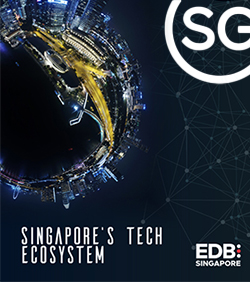Learn about innovations in Singapore’s HealthTech Ecosystem
Download the Singapore HealthTech Ecosystem e-book to learn more

Hidden under Singapore’s concrete jungle is a pulsing tech ecosystem working to improve lives.
The country’s efforts in ramping up its infrastructure – such as 5G and autonomous systems – is not just tech for tech’s sake. Senior Minister of State for Communications and Information Dr. Janil Puthucheary said the investments build a strong future for Singapore and its businesses.
“It is about building a strong society and economy for all, where businesses thrive, opportunity abounds and we look forward with confidence to the future,” he added.
Here’s how the private and public sector are doing good in Singapore.
Saving lives through technology
Just this year, Singapore topped the Smart City Index, which ranks 109 countries based on their technology, economic capabilities, and citizens’ perceptions of how ‘smart’ their cities are. The country was lauded for its prompt response to the COVID-19 situation using technology. But as Frederick Chew, chief executive of the Agency for Science, Technology and Research pointed out, Singapore’s swift response to the pandemic was only possible thanks to the “strong capability base built up and nurtured painstakingly over time.”
Scroll through to find out how these organisations are saving lives
Local tech company Biobot Surgical Pte Ltd teamed up with National Cancer Centre Singapore to develop the automated swab-testing robot. Dubbed “SwabBot”, it reduces the risk of transmission to frontline health workers, provides greater comfort for patients and improves efficiency for mass-testing.
Leveraging the internet of things and artificial intelligence, the National University Health System is using drones and autonomous robots to chart the future of hospital management. Drones monitor critical operations such as power plants, water tanks and building facilities while autonomous robots assist security patrols.
Local bank OCBC has partnered with medical organisations to increase accessibility to healthcare services. Using its HealthPass app, patients can request medicine delivery and video consultations. Meanwhile, startups such as Singapore-based caregiving provider Homage are tackling Asia’s aging population woes, by providing similar services to seniors through its app.
With chronic diseases becoming more prevalent, startups are using deep tech to even the scales. Singapore-born AI solutions provider Qritive’s algorithm uses a combination of machine learning, intelligent image analysis and advanced natural language processing to help hospitals and pathologists perform more accurate and efficient disease diagnosis.

Download the Singapore HealthTech Ecosystem e-book to learn more
Creating a sustainable future
Industry titans such as Microsoft, Google and Hyundai are reducing carbon emissions to achieve a sustainable future. Leveraging Singapore’s vast network of companies (in fact, 80 of the world’s top 100 tech firms are here) and public sector partnership opportunities, businesses have taken tangible steps towards their pledges.
Scroll through to see how companies are creating a sustainable future
In Google’s first renewable energy deal in Southeast Asia, local energy company Sembcorp will provide solar panels across 500 public housing flats to power part of Google’s operations here. The initiative marks another step towards Google’s goal of operating carbon-free by 2030.
To reduce carbon emissions from its data centres, Microsoft inked a 20-year deal with local clean energy solutions provider Sunseap to harness solar energy. The partnership was Microsoft’s first clean energy deal in Asia. Similarly, Sunseap will help Facebook tap into solar panels across 1,200 apartment blocks and 49 government buildings to power its data centre and operations in Singapore.
With EDB’s support, the South Korean carmaker will launch a new electric vehicle manufacturing plant in 2022. Set to produce 30,000 electric vehicles, the plant will also explore sustainable mobility solutions such as hydrogen fuel cells. The factory itself will even be powered by low-emission solutions such as solar panels.

Download the Singapore Tech Ecosystem e-book to learn more
Establishing the next frontier
The public and private sector are not resting on their laurels. Instead, they are launching new initiatives and ramping up infrastructure to lay the foundations for innovation to flourish.
Scroll through to learn how the public and private sectors are building the future
In July 2020, SGInnovate launched the Deep Tech for Good initiative to accelerate development and use of frontier technologies to solve the problems of tomorrow. The joint effort draws from the expertise of organisations spanning across academia, research institutions, industry development organisations, intergovernmental and regional organisations. It will facilitate cross-sharing of knowledge, groom tech talent, foster collaborations via innovation challenges and more.
Tech companies here are partnering up with the public sector to nurture digital talent for the future. Google, Amazon, Huawei and more have launched training programmes for young talent and mid-career professionals. About 18,000 tech jobs are currently available, with the government focussing on creating 1,800 more in the next 12 months.
To provide tech professionals with a larger sandbox to play in, Singapore continues to upgrade its infrastructure – with interim 5G trials underway and plans for half the city-state to be covered by a standalone network by 2022. These allow enterprises to experiment with new uses cases – such as real-time monitoring of patients to better provide healthcare services.